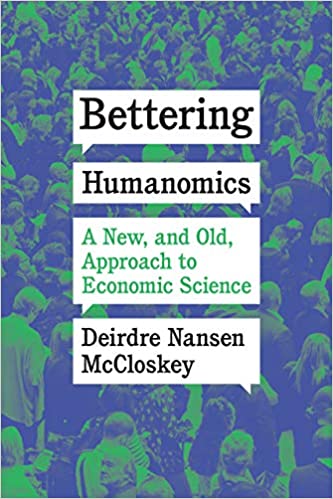In City Journal, Allison Schrager reviews Bettering Humanomics: A New, and Old, Approach to Economic Science by Deirdre McCloskey:
I thoroughly enjoyed Deirdre McCloskey’s Bettering Humanomics, but I may be a glutton for feelings of intellectual inadequacy. Truth be told, I only understood about 60 percent of the book. It contains countless references to great works of the humanities, economics, and the history of economic thought. A casual reader cannot possibly be familiar with a fraction of them, even within his own field. But McCloskey expects you to know them.
At first this book frustrated and confused me. Then I suspected this reaction was by design. I am, after all, an economist myself: I have dedicated my life to learning my craft and benefited from many years of training at great institutions from important thinkers. But reading Humanomics, I became fully aware of how little I know. I now believe that becoming a fully formed economist requires that I stop watching trash TV in my free time and read the Theory of Moral Sentiments instead. McCloskey pulls no punches, whether on her intellectual opponents or on the reader. Here is one example, where she defends herself from a critic, philosopher Gerald Gaus:
Aside from these textual matters, I must say I find myself repelled by Gaus’s vision of people as cynical conformists: “we are such deeply social normative creatures, in the sense that we are so attuned to the normative expectations of others, that we can achieve a stable rule-based system of cooperation even when many are not enthusiastic about the moral attitudes and virtues that the rules express.” I invite him to reread Thucydides’s dialogue between the Athenian diplomats and the Melians, and repent.
McCloskey argues that economics would be better if we listened to people — in controlled experiments, chat rooms, meetings, surveys, and at the Rotary. We need to absorb the lessons from art and culture (perhaps trash TV has value, after all). She does not believe that economists need to ditch math and data, but our overreliance on these tools encourages us to view people as abstractions and leads us astray. Such tendencies also help explain the rise of behaviorism, which assumes that humans are flawed creatures who must be nudged by a wise bureaucrat into better choices; recent flirtations with industrial policy; and the belief that, if we just get our government and laws right, growth will follow.
We must consider how individuals see and experience the world around them, and we must recognize that humans are malleable in ways that we don’t account for. For example, McCloskey estimates a quarter of all income comes from “Sweet Talk” — not lies or trickery, but the ability to be persuasive and compelling, a crucial aspect of sales and advertising. It influences how we perceive the world and can be an important part of motivation.
We economists have lost our appreciation for the humanities, and that means that we underestimate the importance of human dignity. This is no small oversight. McCloskey spends about a third of her book arguing that understanding the humanity of the northwestern European population can explain why it industrialized first. Other countries around the world had wealth, strong institutions, and well-trained mathematicians and engineers (perhaps better ones), but industrialization happened in Britain first because it treated its people with dignity and empowered them with both rhetoric and knowledge.




